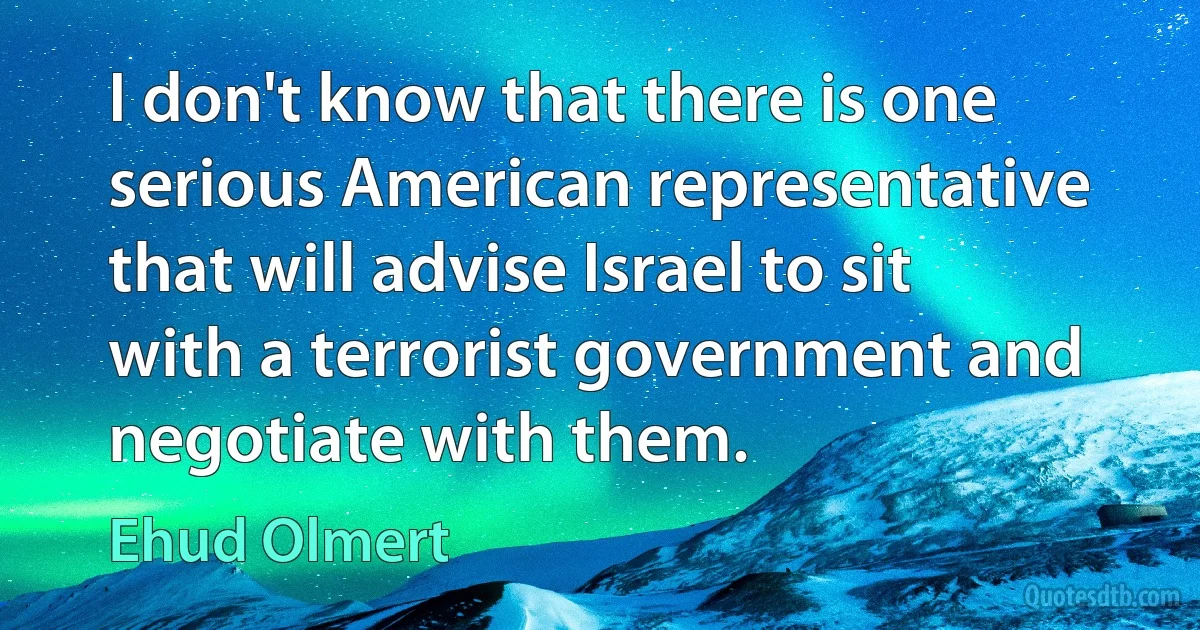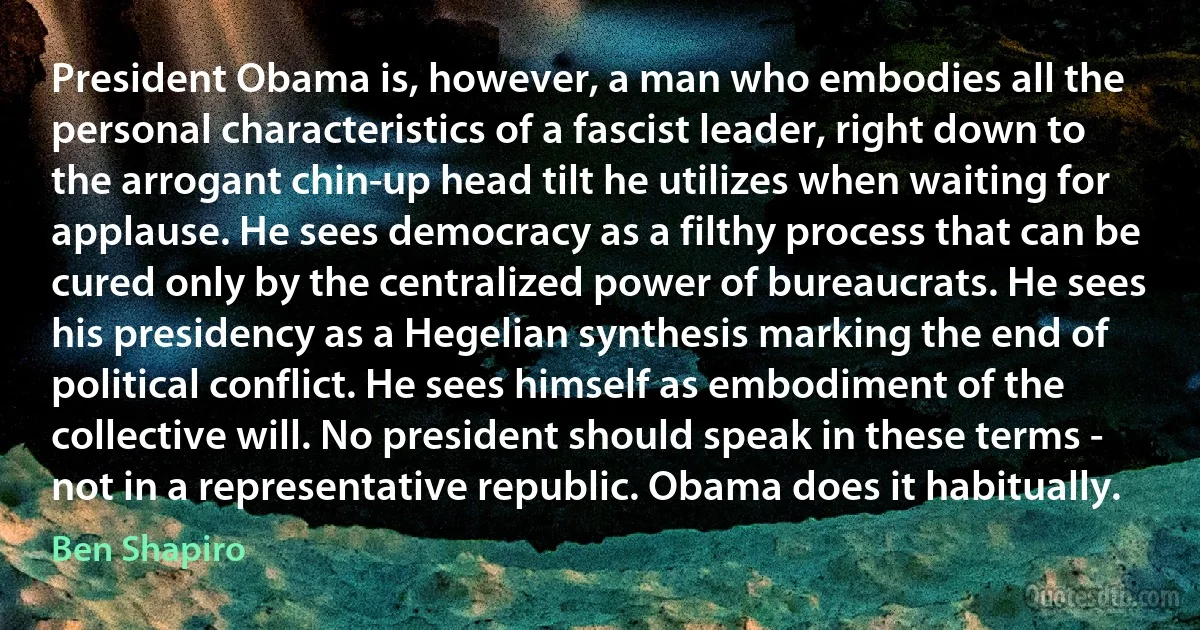Representative Quotes - page 8
I think most Americans understood that the My Lai massacre was not representative of our people, of the war we were fighting, or of our men who were fighting it; but from the time it first became public the whole tragic episode was used by the media and the antiwar forces to chip away at our efforts to build public support for our Vietnam objectives and policies.

Richard Nixon
Government is best which is closest to the people. Yet that belief is betrayed by those State and local officials who engage in denying the right of citizens to vote. Their actions serve only to assure that their State governments and local governments shall be remote from the people, least representative of the people's will and least responsive to the people's wishes.

Lyndon B. Johnson
If you will give your representative similar instructions, there is no reason why we should not be able to complete these arrangements and announce them to the world within a couple of days. The effect of such a settlement on easing world tensions would enable us to work toward a more general arrangement regarding "other armaments," as proposed in your second letter which you made public. I would like to say again that the United States is very much interested in reducing tensions and halting the arms race; and if your letter signifies that you are prepared to discuss a detente affecting NATO and the Warsaw Pact, we are quite prepared to consider with our allies any useful proposals.

John F. Kennedy
I had this sense that ideas about democracy, theories of democracy which I had learned about of course from graduate school on, from Aristotle and Plato onward, that they were inadequate. I don't want to diminish them; I have always retained a great respect for classical and medieval and eighteenth-century theory, but meanwhile a whole new kind of political system emerged to which the term democracy became attached, and for which democracy remained an ideal, even though classical democracy as an ideal was so far removed from reality. The gap between that ideal and the actual political institutions that had developed, particularly from about the sixteenth, seventeenth century on, was just enormous. And what we didn't have enough of, had very little of, was an adequate description of what the actual institutions of so-called democracy, modern democracy, representative democracy, were.

Robert A. Dahl
The man who is thus outside the confines of every value-combination, and has become the exclusive representative of an individual value, is metaphysically an outcast, for his autonomy presupposes the resolution and disintegration of all system into its individual elements; such a man is liberated from values and from style, and can be influenced only by the irrational.

Hermann Broch
The way in which the universe expands is determined by the variation of this [radius of curvature] R with the time. There are three types, or families, of non-static universes... the oscillating universes, and the expanding universes of the first and of the second kind. ...each of these is a representative of a family, comprising an infinite number of members differing in size and shape. ...In the expanding family of the first kind the radius is continually increasing from... zero... In the expanding series of the second type the radius has at the initial time a certain minimum value, different for the different members of the family. [Both kinds of expanding families] become infinite after an infinite time.

Willem de Sitter
The chief marched out to meet his enemy, and fought for three days with the Musulmans. On the fourth he fled, and sought to get back into the city; but the Musulmans reached the gate before the fugitives, overpowered them, and disarmed them. A dreadful slaughter ensued, the women were dishonoured, and the property seized. When Bahira saw this destruction, he fled with some trusty followers to the tops of the mountains. Mahmud sent a force in pursuit, which overtook and surrounded the party, and put all the chiefs to the sword. Bahira saw that no hope was left, so he drew a dagger and killed himself. Mahmud remained in Bhdtia until he had settled its affairs, and drawn up rules for its governance. He then returned towards Ghazna, having appointed a representative at Bhatia to instruct the people who had become Muhammadans.

Mahmud of Ghazni
The party is all-embracing. It rules our lives in all their breadth and depth... Each activity and each need of the individual will thereby be regulated by the party as the representative of the general good... This is Socialism- not such trifles as the private possession of the means of production. Of what importance is that if I range men firmly within a discipline they cannot escape. Let them own land or factories as much as they please. The decisive factor is that the State, through the party, is supreme over all, regardless of whether they are owners or workers... Our Socialism goes far deeper.

Hermann Rauschning
It is a bourgeois feeling to overvalue the possession of representatives. In representation as in money there is power – power over others. Whoever places the purity and the greatness of our party above all else, for him representatives have value only in so far as they serve to give expression to the power and extent of Social Democracy. What do ten, what do a hundred representatives signify, when our escutcheon has lost its gloss through their acquisition? The value of a representative is small. But the value of the integrity of our party is immeasurable. In it rests our strength.

Wilhelm Liebknecht
[T]he formalist school, of whom the most eminent representative is Hilbert, have concentrated on the propositions of mathematics, such as '2 + 2 = 4'. They have pronounced these to be meaningless formulae to be manipulated according to arbitrary rules, and they hold that mathematical knowledge consists in knowing what formulae can be derived from what others consistently with the rules.... for example...'2' is a meaningless mark occurring in these meaningless formulae. But... '2' occurs not only in '2 + 2 = 4', but also in 'It is 2 miles to the station', which is not a meaningless formulae, but a significant proposition, in which '2' cannot conceivably be a meaningless mark.

Frank P. Ramsey
Historically ... it is traditional and habitual for us to be inadequately prepared. This is the combined result of a number factors, the character of which is only indicated: democracy, which tends to make everyone believe that he knows it all; the preponderance (inherent in democracy) of people whose real interest is in their own welfare as individuals; the glorification of our own victories in war and the corresponding ignorance of our defeats (and disgraces) and of their basic causes; the inability of the average individual (the man in the street) to understand the cause and effect not only in foreign but domestic affairs, as well as his lack of interest in such matters. Added to these elements is the manner in which our representative (republican) form of government has developed as to put a premium on mediocrity and to emphasise the defects of the electorate already mentioned.

Ernest King
It is a very high honor to represent our nation and to serve in President-elect Trump's administration as the U. S. Trade Representative. I am fully committed to President-elect Trump's mission to level the playing field for American workers and forge better trade policies which will benefit all Americans.

Robert Lighthizer
The greatest and best of honours that I obtained through God's mercy was, that by my obedience and piety, and friendliness and submission to the Khalifa, the representative of the holy Prophet, my authority was confirmed; for it is by his (Caliph's) sanction that the power of the kings is assured, and no king is secure until he has submitted himself to the Khalifa, and has received a confirmation from the sacred throne.

Firuz Shah Tughlaq



